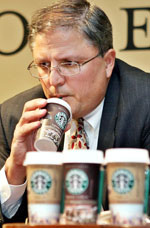“I always say that when we think about ‘Fairtrade’, we need to say ‘behind every cup of coffee there is a family'” – the words of Merling Preza, general manager of a major coffee-growing cooperative in Nicaragua.
Preza delivered her message in London at the launch of Fairtrade Fortnight, which runs until March 11, and is aimed at encouraging Britons to buy products that guarantee millions of producers in poor countries across Africa, Asia and Latin America a minimum price for their goods.
While Fairtrade has helped many coffee farmers and their relatives to improve standards of living, the scheme is a very small battle won in the huge fight to end world poverty, according to aid campaigners.
“Fairtrade has got enormous potential to improve the lives of producers who are involved in Fairtrade schemes but the main problem with trade still lies with the other 99 percent of produce that we buy from developing countries which in a sense is unfairly traded,” said trade campaigner Claire Melamed at charity Action Aid.
British sales of Fairtrade goods, which also include bananas, chocolate and cotton, soared by 46% to $290 million in 2006 from a year earlier, the Fairtrade Foundation said.
Undermining Fairtrade
But despite this, millions of farmers remain in poverty, the London-based charity added in a report to coincide with the start of Fairtrade Fortnight last week.
Melamed is especially critical of companies who use Fairtrade as an attempt to increase their own profits.
“To some extent that undermines the original purpose of Fairtrade which is to get more of the profits to poor people and not to keep more of the profits in the hands of big companies,” she said.
She declined to pinpoint guilty firms. However, Nick Francis, the co-producer of “Black Gold” – a controversial documentary about the world coffee market – pulled no punches. “We are not seeing multi-national coffee companies who have started to use Fairtrade – like Kraft, Nestle, Procter and Gamble, Sara Lee and Starbucks – mainstreaming sustainable initiatives right across the company.
“This is why they are criticized for using these schemes for PR, rather than a genuine attempt to improve the lives of the coffee growers who underpin their business.”
Starbucks, which features in Francis’ acclaimed film, refused to speak to AFP. However on its website, the US coffee giant said: “Requiring economic transparency is a relatively new practice in the coffee industry. “We recognize it will pose enormous challenges, but we are committed to having transparency in prices paid to the farmer.”
Starbucks added that it pays 126 US cents a pound (0.45 kilograms) for non-organic green arabica coffee. On Friday, arabica coffee was trading at 115.65 cents in New York.
Francis meanwhile pointed out that Fairtrade benefits only coffee growers, and not workers who sort out the beans in warehouses, and who earn less than half a dollar a day. “Fairtrade doesn’t address the crucial aspect which is about capturing more from the whole value chain of coffee,” he said.
Making conscious choices
“What Fairtrade relies on is consumers to be making conscious choices. The burden is shifted onto the consumer.” The Fairtrade Foundation cannot legally intervene in retail pricing discussions. Rather it can help only to set producer prices and premiums.
Despite Francis’ criticisms, Preza, who works for Nicaraguan farmers’ cooperative Prodecoop, argued that Fairtrade has transformed the lives of communities in her country.
“We provide the market with a high quality product and in exchange we receive a fair price which enables a good quality of life for all of our members,” Preza added.
Meanwhile Sam Magona, a coffee grower in Uganda, told AFP that whereas before Fairtrade, farmers in his country earned 80 US cents for a pound of coffee, now they take home at least 126 cents a pound, plus a premium worth five cents.
According to the Fairtrade Foundation, the premiums are used to build schools, provide clean drinking water, and allow farmers to grow produce organically, thus helping the environment. “You’ve got to applaud what Fairtrade has done in guaranteeing a minimum price,” Francis said.
“That’s better than what many countries were getting before.”
But the TV producer added: “For there to be some kind of long-term effect much more of the value of coffee has got to be shared by the people who produce it otherwise coffee isn’t going to be sustainable for those countries.”

